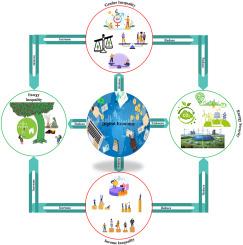Digital economy in reducing energy inequality and enhancing energy security for environmental sustainability
IF 10
1区 环境科学与生态学
Q1 ENGINEERING, ENVIRONMENTAL
引用次数: 0
Abstract
Energy inequality and energy security are critical challenges in developing nations, where rural-urban disparities and unreliable energy systems hinder socio-economic progress and environmental sustainability. Although the digital economy's role in addressing energy challenges has been discussed in previous studies, empirical evidence on its potential to reduce energy inequality and enhance energy security remains limited. Previous research has largely focused on energy access, efficiency, and energy transitions, often overlooking how broader digital transformation influences energy inequality and energy security, especially in developing countries. Furthermore, most existing studies rely solely on traditional econometric methods and lack a deeper analysis of the underlying mechanisms or regional heterogeneity. To fill these gaps, this study draws on the established literature to measure relevant indices and employs both econometric and machine learning techniques to provide a comprehensive analysis. This study analyzed data from 67 developing countries between 2001 and 2021. Using econometric and machine learning approaches, the findings show that a 1 % increase in digitalization reduces electricity access inequality by 0.26 %, clean cooking inequality by 0.13 %, and improves energy security by 0.17 %. These effects are particularly pronounced in regions with severe energy disparities, demonstrating the digital economy's capacity to advance energy equity and reliability while contributing to environmental sustainability. For example, in low-income and lower-middle-income countries, a 1 % increase in digital economy reduces energy inequality by 0.48 % and 0.56 %, respectively. Mediation analysis indicates that addressing income and gender inequalities amplifies the positive impact of the digital economy on energy outcomes. For instance, reducing gender inequality in empowerment enhances digitalization's effectiveness in bridging energy access gaps and improving reliability. This study emphasizes the integration of digital infrastructure with renewable energy systems as a strategic solution for mitigating energy disparities and enhancing energy security. Policymakers should prioritize investments in digital technologies designed for rural and underserved populations, foster digital literacy, and address socio-economic barriers, including income and gender inequalities. By adopting these strategies, governments can optimize the role of the digital economy in achieving equitable and secure energy systems, aligning with sustainable development goals, and promoting environmental sustainability.

数字经济有助于减少能源不平等,加强能源安全,促进环境可持续性
能源不平等和能源安全是发展中国家面临的重大挑战,在这些国家,城乡差距和不可靠的能源系统阻碍了社会经济进步和环境可持续性。尽管数字经济在应对能源挑战方面的作用已经在之前的研究中得到了讨论,但关于其减少能源不平等和加强能源安全的潜力的经验证据仍然有限。以往的研究主要集中在能源获取、效率和能源转型方面,往往忽视了更广泛的数字化转型如何影响能源不平等和能源安全,尤其是在发展中国家。此外,大多数现有研究仅依靠传统的计量经济学方法,缺乏对潜在机制或区域异质性的更深入分析。为了填补这些空白,本研究借鉴已有文献测量相关指标,并采用计量经济学和机器学习技术进行全面分析。这项研究分析了2001年至2021年间67个发展中国家的数据。利用计量经济学和机器学习方法,研究结果表明,数字化水平每提高1%,电力获取不平等就会减少0.26%,清洁烹饪不平等就会减少0.13%,能源安全就会提高0.17%。这些影响在能源差距严重的地区尤为明显,这表明数字经济在促进能源公平和可靠性的同时有助于环境的可持续性。例如,在低收入和中低收入国家,数字经济每增长1%,能源不平等就会分别减少0.48%和0.56%。中介分析表明,解决收入和性别不平等会放大数字经济对能源成果的积极影响。例如,减少赋权中的性别不平等,可以提高数字化在弥合能源获取差距和提高可靠性方面的有效性。本研究强调数字基础设施与可再生能源系统的整合是缓解能源差距和加强能源安全的战略解决方案。政策制定者应优先投资为农村和服务不足人口设计的数字技术,促进数字扫盲,解决包括收入和性别不平等在内的社会经济障碍。通过采用这些战略,各国政府可以优化数字经济在实现公平和安全的能源系统、与可持续发展目标保持一致以及促进环境可持续性方面的作用。
本文章由计算机程序翻译,如有差异,请以英文原文为准。
求助全文
约1分钟内获得全文
求助全文
来源期刊

Journal of Cleaner Production
环境科学-工程:环境
CiteScore
20.40
自引率
9.00%
发文量
4720
审稿时长
111 days
期刊介绍:
The Journal of Cleaner Production is an international, transdisciplinary journal that addresses and discusses theoretical and practical Cleaner Production, Environmental, and Sustainability issues. It aims to help societies become more sustainable by focusing on the concept of 'Cleaner Production', which aims at preventing waste production and increasing efficiencies in energy, water, resources, and human capital use. The journal serves as a platform for corporations, governments, education institutions, regions, and societies to engage in discussions and research related to Cleaner Production, environmental, and sustainability practices.
 求助内容:
求助内容: 应助结果提醒方式:
应助结果提醒方式:


